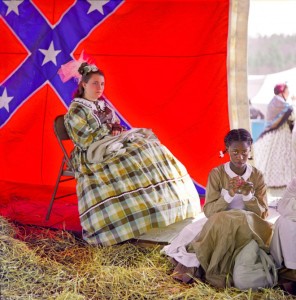I began this blog by thinking of reenactors as people unable to cope with modern-day realities. Then I have an “aha!” moment where I came to see reenactors in the context of those who believe that old buildings are better and more important than new buildings. For me, saving old buildings of historical significance makes sense, but not reenacting. Why? I’m dodging the answer for lack of space, but it is worth exploring.
Reenactors seem to long for a world where their white-male privilege remains intact and where they can equate themselves to people they believe are tougher and untainted by modernity. Kowalczyk and Historiann reinforce this idea when they say reenacting is, “more widespread among white men…Romanticizing the past is a White thing.” While Kowalczyk’s Old Hickory and Captain Titus may be the most extreme examples, they are separated from most reenactors only by degrees. In the few examples given of women participating, their roles seem to reinforce this image of white-male dominance.

Dominant white-males appear to be central to Levin’s article about the Sons of Confederate Veterans. The article also highlights the ambivalence to these re-enactments as fewer reenactors and spectators seem to indicate a backlash against this view of history. Levin notes this may be true, if for no other reason than, “What we do know is that the SCV has done everything in its power over the past few years to alienate reasonable people.” It seems clear that these folks want a whitewashed history so as to maintain their sense of superiority and purity. Dillon Ruth is a reflection of their problem.
I was both disturbed and encouraged by the efforts to make Wikipedia more accurate. The efforts to curate articles were encouraging, but the weighting of articles seems to slow down updating articles with the latest scholarship, as noted in Messer-Kruse’s piece. However, I do feel that Famiglietti made a good case for the current system, which constantly reviews ways to improve. The lack of diversity among content and content-authors is depressing. In this community, I thought there would be more acceptance of women and female-centered content. It would be interesting to know, is this a gender issue or is minority-related content and minority generate content also under-represented? If yes, all of us have work to do.